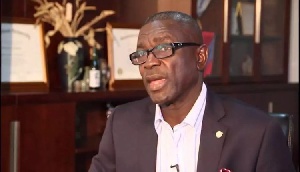 Former CEO of now-defunct UT Bank, Prince Kofi Amoabeng
Former CEO of now-defunct UT Bank, Prince Kofi Amoabeng
There is a new twist to why the local currency - cedi - depreciates against major trading currencies, especially the US dollar.
According to the former Chief Executive Officer of now-defunct UT Bank, Prince Kofi Amoabeng, corruption is one of the causes of the high demand for dollars in Ghana.
He further accused politicians of hoarding dollars, leading to the depreciation of the cedi.
Speaking at the maiden edition of the McDan Business Forum, Kofi Amoabeng said “Ghana exchange rate regime is a pathetic one. The so-called politicians are the ones hoarding the dollars, but it’s seen out there as if they are not the cause of all this. Corruption is part of our problem and we need to work on it”.
"One thing that causes big demand for dollars is corruption. All the money they are making and stealing are not in cedis but in dollars...They must change dollars. So they hide it under their beds and when they get the opportunity they put it outside”, myjoyonline quoted him to have said.
It would be recalled that on October 20, 2022, Bloomberg reported that the cedi had diminished in value by 9.6%.
The news portal said it makes the total loss of the cedi in 2022 almost 52%, the highest recorded in 22 years.
The free fall of the cedi now places the currency at the 148th position of worst-performing currencies in the world.
"The currency depreciated as much as 9.6% on Thursday, heading for its biggest decline in 22 years. That took losses in 2022 to nearly 52%, the worst performance among 148 currencies tracked by Bloomberg," the news portal reported.
During the same period, a committee was formed to hold talks with domestic bond investors on debt management strategy and how to negotiate the deal with the International Monetary Fund (IMF).
Ghana is targeting an amount of $3 billion over a three-year period from the International Monetary Fund (IMF) once an agreement on a programme is reached.
The new amount requested as a loan is double the government’s initial target of $1.5 billion.
The IMF programme is aimed at restoring macroeconomic stability and safeguarding debt sustainability among many others.